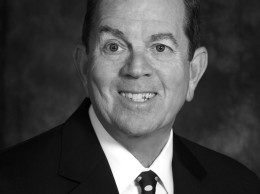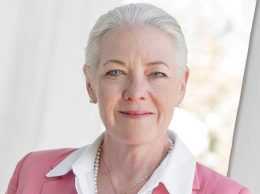Ex-CEO shares Trader Joe’s secrets
Speaking in Thousand Oaks on Nov. 9, former Trader Joe’s CEO John Shields offered up business advice and anecdotes from his thirteen years spent heading up what Fortune magazine recently called “the hottest and most secretive retailer in America.”
Shields, who guided Trader Joe’s growth from 27 to 174 stores and from $132 million to $2 billion in sales from 1988 to 2001, told an audience at California Lutheran University that keeping the company closely held was key.
“Those of you who are private, stay that way,” Shields said. “Those of you who are looking at going public, a psychiatrist should take a look at you.”
Monrovia-based Trader Joe’s was founded in 1967 by Joe Coulombe. Five weeks after Shields retired from Mervyn’s in 1987, Coulombe, an old college friend from Stanford University, approached him with an offer for a consulting gig. That led to Shields becoming CEO when Coulombe retired a year later.
Trader Joe’s was later sold to the German Albrecht family, who own the Aldi Nori chain in Europe, and Shields remained on as CEO.
Coulombe was famously quoted in the Fortune cover story as not remembering how much he sold his namesake for, although the number was reported to be $7.5 million — a tiny amount compared to the estimated $8 billion in sales Trader Joe’s will pull in this year.
“Joe was a pretty good merchant, but a lousy salesman,” Shields joked.
He also said the hands-off Albrechts, who reportedly travel to the U.S. only three days a year, let the U.S. management team run the company as it sees fit.
Trader Joe’s markets itself as a neighborhood grocery store with an affordable and eclectic mix of locally sourced and ethnic or imported food. That international flair comes from the original Joe, who traveled around the world to source food and spent several months in France learning about its wines, Shields said.
But Shields said that after he took the reins, the company underwent a rapid transformation.
“Joe had run the company for 26 years, basically as a benevolent dictator,” he said. When he came in, Shields said he started to delegate responsibilities to his managers and their teams.
Even today, he said, store managers are given fairly basic job descriptions: Maximize profit and keep customers happy.
“You can’t be a control freak as the CEO,” he said. “Be a coach, not a dictator.”
For several years, Shields would spend two days a week out of the office and in stores, notepad in hand, asking employees and managers, “What are we doing at the office to screw you up?”
“And boy, I filled up about 20 notepads,” he laughed.
Shields said his mentors in the business world include Wal-Mart founder Sam Walton and Southwest Airlines founder Herb Kelleher, both of whom he described as “geniuses.”
Soon after he came to Trader Joe’s, Shields established a simple vision statement for the company, which states that the firm will be an ethical company operating a small chain of neighborhood grocery stores staffed by friendly people having fun.
Trader Joe’s boasts a 4 percent employee turnover rate — the lowest in the grocery industry, which can see turnovers rates as high as 20 percent.
The key to worker retention is comfortable salaries and retirement benefits, coupled with entrusting employees with responsibility and promoting almost exclusively from within, Shields said.
“Our people are the highest paid in the industry and they have twice the production,” he said.
Are you a subscriber? If not, sign up today for a four-week FREE trial or subscribe and receive the Book of Lists free with your purchase.












